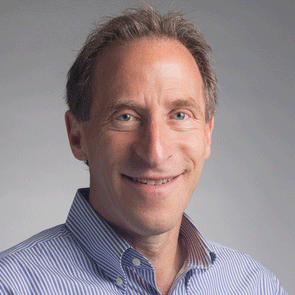Gideon Gil
Knight Science Journalism Fellow, ’14-15

Gideon Gil is health and science editor of The Boston Globe, where he has directed print and online coverage of health care, science, and the environment for 10 years. His reporters have won one Pulitzer Prize, for coverage of stem cells, and twice been named finalists. He previously was a medical reporter and editor at the Louisville Courier-Journal, where he was part of a team awarded a Pulitzer for investigating the causes of a fatal bus crash that took 27 lives. He is a board member of the Association of Health Care Journalists and chairs its membership committee and Boston chapter.
What has been your most enjoyable or enriching experience at MIT so far?
Aside from getting to know the other Knight Science Journalism fellows, my most rewarding experience has been a project I worked on in Professor Ed Boyden's “Principles of Neuroengineering” class, along with a Sloan MBA student and an undergraduate bioengineering major. Our challenge was to transform EyeWire, the MIT-based online crowd-sourcing platform for mapping neurons, into more of a game, so that more people would participate. Our solution was to import the data into the 3-D world of the popular game Minecraft — enabling players to travel inside neurons.
At the start, I didn't think I would be able to contribute much to the project. But I learned first-hand the power of MIT-style, interdisciplinary teamwork. By combining our varied skillsets and problem-solving methods, we accomplished something that none of us could have done on our own. It's a lesson I will take back with me to my newsroom.
“The power of MIT-style, interdisciplinary teamwork — combining varied skillsets and problem-solving methods to accomplish something that none of us could have done on our own — is a lesson I will take back with me to my newsroom.”
What has been the focus of your research during your Fellowship? Why is this topic/issue/cause important to you and for the public?
I'm interested in developing a better understanding of Big Data and how journalists can make use of it to ask and answer questions, especially in relation to health care and the environment. To that end, I’m working with a research team at the Harvard School of Public Health to examine issues of patient safety and health care quality, using large government databases. I’m also interested in how journalists can present data in more engaging and innovative ways.
What advice do you have for a young MIT student who is interested in a career in science journalism?
A solid grounding in and passion for science is essential, but being immersed in the culture of science can also be a hindrance if you're unable to step back and explain concepts clearly, without jargon, and tell a compelling story. So I recommend that students read good writers, and not just good science writers — read nonfiction, novels, newspapers, magazines, blogs — and take classes in the excellent MIT Graduate Program in Science Writing. Go to the offices of The Tech and start covering news — again, it doesn't have to be science writing. Science journalists have to acquire the same fine reporting, writing, and multimedia skills that all excellent journalists have.
Suggested Links
Knight Science Journalism website
MIT Science Writing Program website
The Boston Globe science section
Interview with Gideon Gil at the Globe
Story prepared by MIT SHASS Communications
Editorial team: Emily Hiestand and Daniel Pritchard